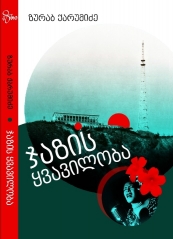JAZZMINE
In March 1956, the Soviet army stormed peaceful rallies in Tbilisi, Georgia; people went out onto the streets to defend Stalin and Georgian identity after Khruschev’s speech of denunciation at the Communist Party Congress. The events that followed this violent repression later developed into the emergence of nationalism in Soviet Georgia, a process which lasted for several decades. In the same year, 1956, the CIA launched a project ‘Ambassadors of Jazz’ – including the VOA jazz program hosted by Willies Connover. The project was intended to influence the population of the Socialist Block countries, to plant the seeds of freedom and liberation in people’s minds. This was the beginning of the clandestine invasion of jazz music and American culture in general into Georgia too. Groups of aesthetic dissidents appeared in Tbilisi, as well as the first jazz musicians. The story here is of the collision between nationalism and individual freedom. The CIA project was also masterminded and inspired by occult celestial forces, which worked to incite globalization developments on the Planet Earth. A pagan Georgian character from the 20th century literary classic novel had a hand in this too. This book is in its way a sequel to Zurab Karumidze’s earlier novels: Dagny or a Love Feast and Foxtrot.
‘The author attempts a deconstruction of the stereotypes of Georgian Soviet space and by using real material and powerful artistic imagination, he succeeds to a remarkable degree.‘
Shota Iatashvili, poet, literary critic Radio Liberty
EXTRACT
Translated into English by Maya Kiasashvili
Chapter 1
Love in the Month of March
Lenin and Stalin walked into the Veliaminov diner, ordered ten Khinkali each and two pints of beer and went over to a vacant table..... These were the Gori Drama Theatre actors wearing the great leaders’ make-up and their clothes; since the early morning they were driven around the city to entertain the crowds gathered for spontaneous rallies.
The whole country was agitated; thousands went to rallies in Tbilisi, Kutaisi, Tskhinvali, Sokhumi, Batumi and of course Gori. Students and schoolchildren made an absolute majority, who was joined by factory workers and a few intellectuals. Soon the marches attracted the pupils’ parents, too. An amazing number of protesters were young women and girls, the most active of them all, an extremely surprising fact for a patriarchal country such as Georgia..... Wreaths were laid at the statue of the Soviet leader, poems were recited and songs were sung in his honor..... Stalin and Georgia were praised, while Khrushchev and the Russians were sworn at: ‘The only mistake made by Stalin was not executing that bald Khrushchev.....’
All of this was triggered by Nikita Khrushchev’s speech at the 20th Party Congress in Moscow about the cult of personality in which he denounced Stalin’s purges, criticizing him and his policy. Particularly upsetting was the part where he talked about Stalin and Beria both being Georgians, which meant Georgian nationals exercised special treatment and enjoyed certain privileges during the purges, etc.
The situation was further aggravated by Anastas Mikoyan’s speech at the Congress, which by many was interpreted as an indirect insult to the Georgian nation...(See PDF)
